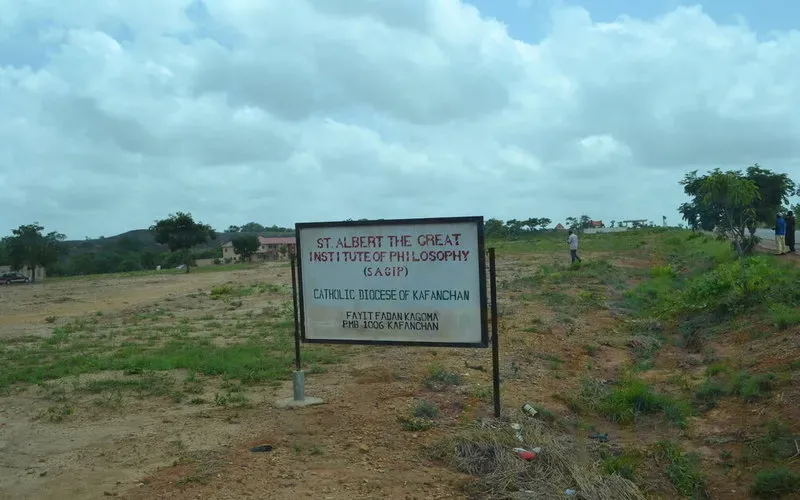
Denver Newsroom, Jan 28, 2022 / 18:01 pm (CNA).
Victims of persecution in Nigeria must be listened to, an expert on the persecution of Christians told students at the Franciscan University of Steubenville on Friday.
Stephen Rache, an American lawyer who has worked extensively in persecuted Christian communities in Iraq and Nigeria, told students that the Nigerian government has largely abdicated its responsibility to keep its citizens safe, resulting in widespread religiously motivated violence and a general lawlessness in the northern part of the country.
To make matters worse, he said, the United States Secretary of State this year, for as-yet undisclosed reasons, no longer lists Nigeria as a “Country of Particular Concern” on a watchlist of countries with the most egregious violations of religious freedom. The U.S. Commission on International Religious Freedom has been recommending the designation of Nigeria as a CPC since 2009.
“The result of that is that the Christians are just out of options in terms of getting governments to recognize the truth of what’s happening,” Rache said.
Rache’s Jan. 28 talk, “Nigeria on the Brink: The Current Crisis of Anti-Christian Violence in Nigeria and the International Response,” was moderated by writer Kathryn Jean Lopez of National Review.
The talk featured pre-recorded video messages from two Nigerian bishops: Stephen Dami Mamza of Yola and Matthew Hassan Kukah of Sokoto.
Mamza, who has had several family members killed by the Islamist group Boko Haram, recently challenged the United States Secretary of State to justify his decision to remove Nigeria from the persecution watchlist, saying that he has witnessed the brutal ongoing persecution against Christians in Africa’s most populous nation.
In Nigeria as a whole, at least 60,000 Christians have been killed in the past two decades. An estimated 3,462 Christians were killed in Nigeria in the first 200 days of 2021, or 17 per day, according to a new study.
Violence against Christians is especially intense in the northern part of the country, Rache reported, noting that Nigerians must regularly endure kidnappings along major highways, and raids by Muslim herdsmen. In addition, the country’s northern borders are far from secure, with many Muslim raiders crossing from the Sahel to raid Christian villages.
In areas where large numbers of Nigerians have been driven from their homes by the violence, over 80% of internally displaced people are women and children, he said. Rache said in his view, the United Nations and foreign governments, including the U.S. government, have not been telling the truth about the level of persecution in the country.
In his recorded message, Bishop Kukah noted that his diocese is in the former location of a caliphate, and that “violent persecution has always been there in some form.” The said he sees an absence of Christians in public life, as the result of a clear effort by Muslim authories to keep Christians out of public life.
Despite the challenges, Kukah noted that Catholic education has had a positive impact on Nigeria for decades.
Both Mamza and Kukah stated unequivocally that Islamist extremism is at the heart of the violence, and that not only Christians but also other Muslims are at risk.
“Within the Islamic world right now, there is an element of violence that needs to be addressed,” Rache added.
Kukah said he believes “we have lost a sense of friendship in Nigeria, there’s no doubt about it,” and decried what he sees as a culture of suspicion, fear, anxiety among neighbors.
He encouraged all people to take brotherhood and sisterhood more seriously, mentioning Pope Francis’ encyclical on fraternity and social friendship, Fratelli tutti. Kukah said the document and its recommendations on being a good neighbor and protecting the vulnerable is available to “all men and women of good will,” not just Christians.
“We don’t have to wait for the Church to collectively decide how to put it into practice,” he noted.
If you value the news and views Catholic World Report provides, please consider donating to support our efforts. Your contribution will help us continue to make CWR available to all readers worldwide for free, without a subscription. Thank you for your generosity!
Click here for more information on donating to CWR. Click here to sign up for our newsletter.





Given a fallen world, do we actually have two guidances to follow? Yes, with Bishop Kukah who “encouraged all people to take brotherhood and sisterhood more seriously, mentioning Pope Francis’ encyclical on fraternity and social friendship, Fratelli tutti.”
But, also, the stark proposition (?), that ““[i]ndeed, there is no ‘compelling argument’ not to slit anybody’s throat except for the Commandments given on Mount Sinai.”
The author of the second remark, the well-travel scholar Eric von Kuehnelt-Leddihn, relevantly and in the less disrupted 1990s, was singled out to be a Western guest at a large meeting of Islamic scholars in Muscat, Oman. Without advance notice he was asked what he thought was the source of the modern “crisis of Islam.” At possible personal risk and almost as a summary of a most complex subject, he responded: “It is because you do not respect your women.” How then, to tame the anachronistic warrior code of killing now even in the name of Allah?
Yes, to “fraternity,” but only by this appeal for (secular?) civility?